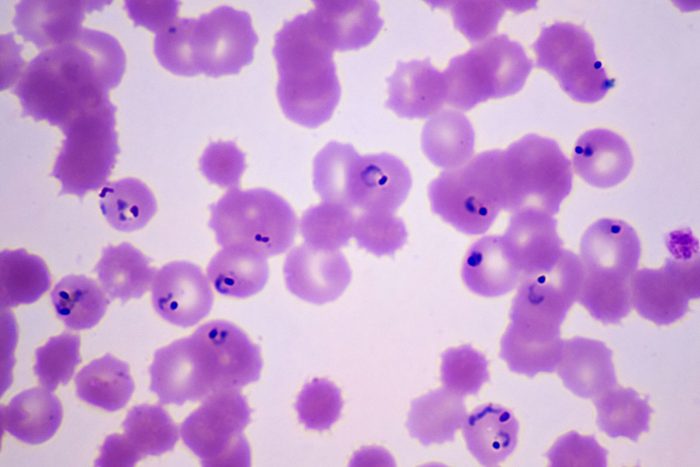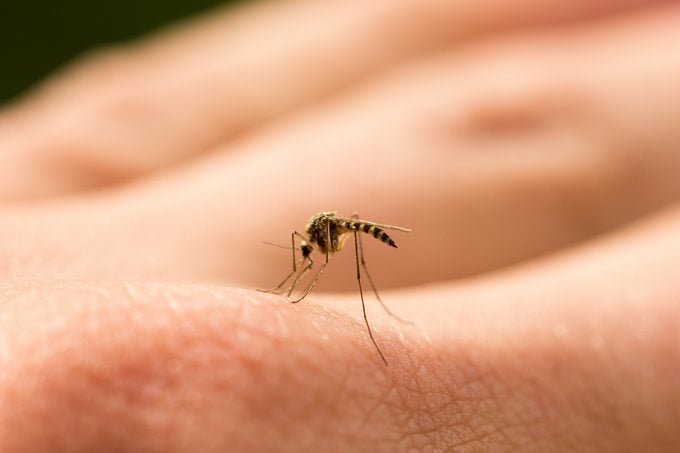Malaria in the U.S. – What Virus Experts Want You to Know
Updated: Jul. 27, 2023

This summer malaria has been acquired inside the United States for the first time in 20 years. "Malaria ... has to be taken seriously," says one Texas infectious disease doctor.
Some insects serve practical purposes: Earthworms aerate soil, some spiders gobble up other mischievous bugs. But mosquitoes? Most of us would agree their only function is to drive us bonkers in discomfort.
Worst of all, mosquitoes spread a few nasty diseases. Case in point: As of July 20, 2023, the CDC had announced eight malaria cases in Florida and Texas. These were the first known locally acquired malaria cases in the US in two decades.
Malaria is a disease well known for being endemic and quite deadly in Africa, and half the world’s population is at risk…but the USA isn’t usually in harm’s way. While there have been pockets of the disease in America—about 1,500 Americans a year end up with malaria from traveling outside the country—in 1951 malaria was declared as having been eliminated in the US, according to the CDC.
So what makes these eight cases so alarming? Malaria typically turns up in the US when American residents travel abroad, contract malaria, and then return home. On the other hand, when experts say these eight new cases were “locally acquired,” that means that the infected individual acquired the virus from a mosquito inside the US, says virologist Scott Weaver, PhD, director of the Institute for Human Infections & Immunity and a professor at the University of Texas Medical Branch.
Get The Healthy @Reader’s Digest newsletter
What is your risk of getting malaria in the US?
Before you panic, Dr. Weaver says he doesn’t anticipate widespread breakouts of malaria around the country.
Malaria isn’t a virus or bacteria. It’s caused by a single-celled parasite that multiplies in the red blood cells of humans and inside the intestines of mosquitoes. The illness can range from mild to severe to fatal. Whether or not you get it, and how bad your case is, depends on three factors.
The first is the type of mosquito. There are lots of nasty disease-spreading, blood-sucking insects, but malaria is transmitted by only one. Only female Anopheles mosquitoes can transmit malaria, and they must have been infected through a previous blood meal taken from an infected person. Dr. Weaver says there are Anopheles mosquitoes in the US. They exist mainly in the warmer parts of the country and, in some areas (before the effects of climate change started to grow so severe), they die off in the winter.
The second factor contributing to how likely you are to become infected malaria is the way people catch the illness. “Malaria is transmitted from mosquito to human to mosquito, causing a chain of transmission,” Dr. Weaver explains. “It doesn’t go from human to human, so it is only contagious in places where there is a lot of mosquito exposure—and the US has less mosquito exposure than most parts of the world.”
Third, while malaria is a serious and potentially fatal disease, there are five different kinds of malaria and some are worse than others. Plasmodium vivax, the type the US patients reportedly contracted, isn’t the most severe and isn’t usually fatal, says Linda Yancey, MD, an infectious disease doctor affiliated with Memorial Hermann hospital.
Mosquito Bites: 10 Weird Reasons You’re Getting Bitten
How many people get malaria in the US?
Of the average 1,500 Americans who contract malaria each year, about five expire from it…but, Dr. Weaver says, the truth is that it’s hard to really know how many people in the US have malaria. It isn’t routinely tested for here, and its symptoms—fever, chills, headache, nausea, body aches, exhaustion—mimic many other viral illnesses.
“There are certainly more cases of malaria in the US than we know about,” Dr. Weaver says.
That said, he points out that it’s still rare in the US due to widespread use of air conditioning, screened windows, and community mosquito control programs. “These things significantly reduce our exposure to mosquitoes and therefore the diseases that they carry,” he says. “This is why poorer people are at the highest risk for malaria: Because they can’t afford these measures or don’t have access to them.”
The Scientific Reason You Are (Or Aren’t) a Mosquito Magnet
So is it true that malaria isn’t a worry in the US?
There’s a public perception that people in the US don’t need to worry about malaria—that either it isn’t here, or that we have appropriate treatments for it so it wouldn’t be so bad if someone does get sick. “All of the mosquito-borne infections carry risk,” Dr. Yancey says. “Even though the vivax malaria that we are seeing in this instance causes a less severe illness than Falciparum malaria, even a less severe case of malaria is still malaria and has to be taken seriously,” she adds. “While we do have effective treatments for malaria, it could still land people in the hospital.”
She adds that people with a compromised immune system—such as those on chemotherapy or taking immunosuppressive drugs for conditions like lupus or rheumatoid arthritis, just as examples—are at higher risk for more severe disease.
Dr. Yancey suggests that in sum, people in America should be aware and cautious of malaria, but not afraid.
The US is at an increasing risk of mosquito borne diseases

Dr. Weaver says while the malaria-carrying mosquitoes aren’t common year round in the US, that is changing. Scientists are now finding them in unexpected places.
One reason for this is global climate change as mosquitos of all types thrive in warmer weather. “Unfortunately as the world warms up, we are seeing fewer hard freezes in the winter,” this virology expert says. “This allows mosquito populations to stay higher than they have in the past when most of them would be killed off by cold weather,” Dr. Yancey says. “We are also seeing year-round mosquito activity moving north into places that historically have not had a problem with them in the cooler months.”
He explains that another weak spot when it comes to preventing outbreaks of malaria in the US is that programs to control mosquitoes are local, not federal, and vary in quality from place to place.
A 2021 study found that the US has multiple risk factors for local malaria outbreaks. These will continue to pose a public health threat due to large numbers of international travelers from endemic areas, which increases numbers of Anopheles mosquitoes, and a lack of preparation and planning for mosquito-borne disease outbreaks.
Dr. Weaver says this is worrisome for malaria—but it’s even more concerning for other diseases people get from mosquito bites, especially West Nile Virus. “West Nile is the biggest risk to people in the US, yet we almost never hear about it even though it can be fatal,” he says. “It’s transmitted from birds to mosquitoes to humans, which makes the cycle much harder to control.”
The 10 Itches You Should Never, Ever Scratch
Can you treat malaria yourself?
Malaria is typically treated with prescription antiparasitic medications, but there is a longstanding myth that you can treat malaria on your own with tonic water. “This isn’t true,” Dr. Yancey says. “While the observation that tonic water helped to treat malaria is how we discovered the drug quinine, tonic water all on its own is not sufficient to protect people from malaria. Gin and tonics are tasty, not medication.”
How to prevent getting malaria
“The absolute best thing you can do to avoid getting malaria, West Nile, and other diseases from mosquitoes is to prevent getting bit in the first place,” Dr. Weaver says. This virologist offers a few wise ways to avoid mosquito bites:
- Avoid going outdoors at dawn and dusk.
- Wear loose, long-sleeved tops and full-length pants outdoors
- Keep windows closed or use tight-fitting screens
- Wear insect repellent with DEET or picaridin when you are outdoors
- Push for vector management programs (like mosquito spraying) in your neighborhood
- Check out our shopper-reviewed list of the most effective products to avoid mosquito bites
The bottom line (for now), Dr. Yancey says, is that “this is only a concern to people in those two states right now. And given that we have had less than 10 cases total, the overall risk for most people is very low,” she says. “Folks in Texas and Florida may want to take additional steps to avoid mosquitoes.”
Get The Healthy @Reader’s Digest newsletter and follow The Healthy on Facebook, Instagram, and Twitter. Keep reading:
- This Is the #1 Worst Soap Fragrance for Repelling Mosquitoes, Says New Study
- This Is the Best Diet for Your Heart, Says New Report
- I’m a Hand Surgeon—Here Are 6 Things I’ll Never Do in July
- I Ate Hot Dogs Every Day for a Week—Here’s What Happened
- This Popular Exercise May Delay Onset of Alzheimer’s Disease, Says New Study














